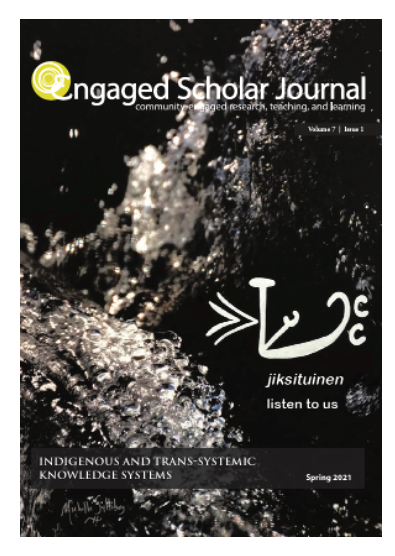Mi’kmaq / Non-Mi’kmaq Conversational Turn-Taking
DOI:
https://doi.org/10.15402/esj.v7i1.69552Keywords:
Mi'kmaq, conversation, turn-taking, Indigenous, cross-cultural, academic discourseAbstract
Turn-taking during verbal interactions is a linguistic and cultural pattern that regulates who is to speak during a conversation and when. Conversational turn-taking includes the length of time that occurs after the speaker says something and before the person spoken to responds (Ryan & Forrest, 2019). Within the academy at this current time of 2020, diverse knowledge holders, both Indigenous and Non-Indigenous, are actively trying to share and merge knowledge epistemologies across culture and across language. Though sharing is now actively taking place much more frequently between these two groups of scholars within Canadian universities, full comprehension of what is being communicated is not always realized by both parties. This is not due to any fault on the researchers’ part, but because many times two turn-taking paradigms are being used in a conversation instead of one.
References
Alex, L., Denny, S., Ernst, S., Johnston, A., & Lenahan, S. (2018). Mutual learning about speech and language development: Conversations between L’nu speaking senior university students and non-L’nu speech Language Pathology Students. Poster session presented at Research Project Presentations: Dalhousie University School of Communication Sciences and Disorders, Halifax, NS.
DeVito, J. (2014). Essentials of human communication (8th ed.). Pearson.
Indigenous Affairs. Cape Breton University. (2020, November 13). https://www.cbu.ca/indigenous-affairs/
Johnson, P. (1996). Micmac. In F. E. Hoxie (Ed.), Encyclopedia of North American Indians (pp. 376-8). Houghton Mifflin.
Little Bear, L. (2009). Naturalizing Indigenous knowledge: Synthesis paper. University of Saskatchewan, Aboriginal Educational Research Centre & Calgary First Nations and Adult Higher Education Consortium.
Ryan, J., & Forrest, L. (2019). ‘No Chance to Speak’: Developing a pedagogical response to turn-taking problems, Innovation in Language Learning and Teaching. https://doi.org/10.1080/17501229.2019.1687709
Stivers, T., Enfield, N. J., Brown, P., Englert, C., Hayashi, M., Heinemann, T., … Levinson, S. C. (2009). Universals and cultural variation in turn-taking in conversation. Proceedings of the National Academy of Sciences, 106(26), 10587-10592. https://doi.org/10.1073/pnas.0903616106
Published
How to Cite
Issue
Section
License
Authors who publish with this journal agree to the following terms:
- Authors retain copyright and grant the journal right of first publication with the work simultaneously licensed under a Creative Commons Attribution License CC BY 4.0 that allows others to share the work with an acknowledgement of the work's authorship and initial publication in this journal.
- Authors are able to enter separate, additional contractual agreements for the non-exclusive distribution of the journal's published version of the work (e.g., post it to an institutional repository or publish it in a book), with an acknowledgement of its initial publication in this journal.
- Authors are permitted to post their work online (e.g., in an institutional repository or on their website) after the publication of their work in the Engaged Scholar Journal.
- Please note that while every opportunity will be taken to ensure author participation in the editing process, due to time constraints final copyediting changes may be made before publication to ensure APA adherence throughout all submissions.




